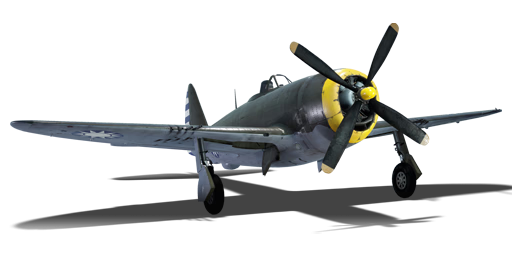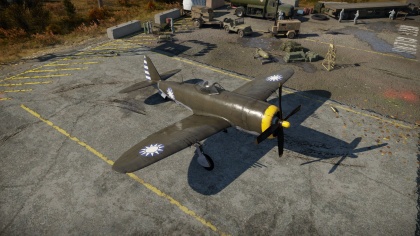P-47D-30 (China)
Contents
| This page is about the Chinese fighter P-47D-30 (China). For other versions, see P-47 (Family). |
Description
The ␗P-47D-30 Thunderbolt is a rank III Chinese fighter
with a battle rating of 4.0 (AB), 5.0 (RB), and 3.7 (SB). It was introduced in Update 1.91 "Night Vision".
General info
Flight performance
| Characteristics | |||||||
|---|---|---|---|---|---|---|---|
| Stock | |||||||
| Max Speed (km/h at 9,144 m) |
Max altitude (meters) |
Turn time (seconds) |
Rate of climb (meters/second) |
Take-off run (meters) | |||
| AB | RB | AB | RB | AB | RB | ||
| 689 | 673 | 12500 | 24.1 | 24.8 | 10.1 | 10.1 | 700 |
| Upgraded | |||||||
| Max Speed (km/h at 9,144 m) |
Max altitude (meters) |
Turn time (seconds) |
Rate of climb (meters/second) |
Take-off run (meters) | |||
| AB | RB | AB | RB | AB | RB | ||
| 743 | 714 | 12500 | 21.9 | 23 | 19.2 | 14.1 | 700 |
Details
| Features | ||||
|---|---|---|---|---|
| Combat flaps | Take-off flaps | Landing flaps | Air brakes | Arrestor gear |
| ✓ | ✓ | ✓ | X | X |
| Limits | ||||
|---|---|---|---|---|
| Wing-break speed (km/h) |
Gear limit (km/h) |
Combat flaps (km/h) |
Max Static G | |
| + | - | |||
| 885 | 450 | 520 | ~12 | ~5 |
| Optimal velocities | |||
|---|---|---|---|
| Ailerons (km/h) |
Rudder (km/h) |
Elevators (km/h) |
Radiator (km/h) |
| < 402 | < 420 | < 470 | > 335 |
| Compressor (RB/SB) | ||
|---|---|---|
| Setting 1 | ||
| Optimal altitude | 100% Engine power | WEP Engine power |
| 8,500 m | 2,000 hp | 2,300 hp |
Survivability and armour
Examine the survivability of the aircraft. Note how vulnerable the structure is and how secure the pilot is, whether the fuel tanks are armoured, etc. Describe the armour, if there is any, and also mention the vulnerability of other critical aircraft systems.
Armaments
Offensive armament
The P-47D-30 (China) is armed with:
- 8 x 12.7 mm Browning M2 machine guns, wing-mounted (425 rpg = 3,400 total)
Suspended armament
The P-47D-30 (China) can be outfitted with the following ordnance:
- Without load
- 1 x 500 lb AN-M64A1 bomb (500 lb total)
- 2 x 1,000 lb AN-M65A1 bombs (2,000 lb total)
- 2 x 1,000 lb AN-M65A1 bombs + 1 x 500 lb AN-M64A1 bomb (2,500 lb total)
- 10 x HVAR rockets
- 1 x 500 lb AN-M64A1 bomb + 10 x HVAR rockets (500 lb total)
- 2 x 1,000 lb AN-M65A1 bombs + 10 x HVAR rockets (2,000 lb total)
- 2 x 1,000 lb AN-M65A1 bombs + 1 x 500 lb AN-M64A1 bomb + 10 x HVAR rockets (2,500 lb total)
Usage in battles
Always maintain speed. The P-47 handles like a dream at about 350-400 mph (563-643 km/h), but once it gets to >220 mph it handles as a pig dipped in mud. One great thing about the handling at high speed, though, is that the P-47 responds quickly at high speeds, and this allows some impressive defensive scissoring without losing wings at terminal velocity. The high-wing loading is an issue, though, as the Jug will lose most of its energy in a blackout turn. This does endow the Jug with one key feature- it is a rock-solid gun platform.
Unfortunately, zoom-climbing and dive acceleration are not the "Jug's" forte. The BF-109 has a superior dive acceleration, and the Fw 190 can zoom-climb far faster. Still, the energy retention of the P-47 is great, along with the fact that it flies far faster than both the Würger and Messerschmitt. The P-47 is NOT A TURN-FIGHTER. Although it is possible to out-turn a heavy fighter like the BF-110 C or Do 217, it is not recommended- the acceleration is mediocre, and once a P-47 is a sitting duck, it will be swarmed like flies to fruit in a compost pile. Acrobatic pilots will not be impressed by the P-47 as well, because it performs Immelmans very sluggishly and the roll rate is not magnificent as well.
Durability, as mentioned above, is pretty good. As in WW2 itself, the P-47 was renowned for its rugged construction. In War Thunder, the biggest weak point of the P-47 is its engine and wings. The wings can break fairly easily in manoeuvres at speeds around ~ 675.9 kph or so. They also tend to break after a well-placed cannon burst (from planes like the FW-190, A6M2/3). The engine though is also fairly susceptible to catching fire while chasing a bomber, but this is not due to its durability but to its size. Speaking of fire, the P-47D will be heavily damaged by the time it pulls itself out of a fire. One should immediately try to limp home if set aflame.
Performance of the P-47 at altitude is very good, but once you go above about 9,000 meters (~30,000 feet, its critical altitude), any energy lost will have to be regained by diving and losing altitude. Even though the D-30 now gets 70" boost (which is significantly more than the D-25), it still will have some troubles accelerating and climbing. Keep in mind that this boost is only achieved on WEP, although on military power it still has 65" of boost.
When used skillfully, the tracer rounds can be used to "derp", because of the high calibre (for a machine gun) and fire rate, tracers can be absolutely terrifying to anyone attacked by them. However, due to the "scare" effect and low takedown capabilities, the tracers have limited practical use.
Manual Engine Control
| MEC elements | ||||||
|---|---|---|---|---|---|---|
| Mixer | Pitch | Radiator | Supercharger | Turbocharger | ||
| Oil | Water | Type | ||||
| Controllable | Controllable Auto control available |
Controllable Not auto controlled |
Controllable Not auto controlled |
Separate | Controllable 1 gear |
Auto controlled |
Pros and cons
Summarise and briefly evaluate the vehicle in terms of its characteristics and combat effectiveness. Mark its pros and cons in the bulleted list. Try not to use more than 6 points for each of the characteristics. Avoid using categorical definitions such as "bad", "good" and the like - use substitutions with softer forms such as "inadequate" and "effective".
Pros:
- Great at diving and Boom & Zoom
- Impressive firepower
- Impressive payloads
- Great engine performance above 6,000 m
- Fantastic gun platform- the 2 "quartets" of M2s are extremely accurate and in many cases as powerful as cannon
- Great high-speed handling
- Fantastic top speed in level flight
- Fantastic ground attack capability
- Good scissoring capability
- Great durability
- Great cockpit visibility
- Cools rapidly and can WEP for a long duration of time without overheating
- Has 20 Mins of ADI
- Currently running 70" of boost, almost as high as P-47M, P-47N
Cons:
- Terrible turning radius at low altitude
- Mediocre climb performance (but fully spaded you can reach 20m/s at 15*)
- Engine prone to being set on fire
- Poor low-speed handling
- Large target
- Engine can overheat quickly if you constantly use WEP
- Machine guns are mounted very far apart
History
Thunderbolt pilots flew into battle with the roar of a 2,000-horsepower radial engine and the flash of eight .50 caliber machine guns. This combination of a robust, reliable engine and heavy armament made the P-47 a feared ground-attack aircraft. U.S. Army Air Forces commanders considered it one of the three premier American fighters, along with the P-51 Mustang and P-38 Lightning. The United States built more P-47s than any other fighter airplane.
After World War II, the Chinese Nationalist Air Force received 102 P-47Ds used during the Chinese Civil War. The Chinese Communists captured five P-47Ds from the Chinese Nationalist forces. In 1948, the Chinese Nationalists employed 70 P-47Ds brought to Taiwan in 1952. P-47s were used extensively in aerial clashes over the Taiwan Strait between Nationalist and Communist aircraft.
Media
Excellent additions to the article would be video guides, screenshots from the game, and photos.
See also
Links to the articles on the War Thunder Wiki that you think will be useful for the reader, for example:
- reference to the series of the aircraft;
- links to approximate analogues of other nations and research trees.
External links
Paste links to sources and external resources, such as:
- topic on the official game forum;
- encyclopedia page on the aircraft;
- other literature.
| China fighters | |
|---|---|
| British | ␗Gladiator Mk I |
| French | D.510C |
| Japanese | ␗A6M2 · ␗Ki-27 otsu · ␗Ki-43-III ko · ␗Ki-44-II hei · ␗Ki-61-I otsu · ␗Ki-84 ko |
| American | CW-21 · Hawk III · P-66 · ␗P-40E-1 · H-81A-2 · ␗P-43A-1 |
| ␗P-47D-23-RA · ␗P-47D-30 · ␗F-47N-25-RE · ␗P-51C-11-NT · ␗P-51D-20 · ␗P-51K | |
| Soviet | ␗I-15bis · ␗I-153 M-62 · ␗I-16 Chung 28 · ␗I-16 type 5 · ␗I-16 type 10 · ␗I-16 type 17 · ␗La-11 · ␗La-9 |





